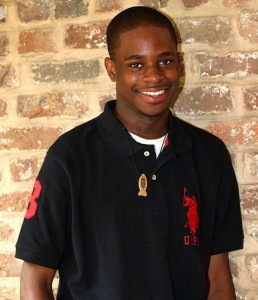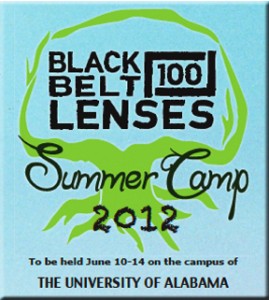
By Kirsten J. Barnes CCBP Graduate Assistant
What started out as a summer camp experience inspired 19-year-old D'Anthony Jackson to launch his own business, select a major in journalism and compete for a summer internship two years later at the UA Center for Community Based Partnerships (CCBP).
After spending two summers as a participant with the Black Belt 100 Lenses project, a photojournalism camp that prepares high school students in the art of photography by talking photos of people and places throughout Alabama's Black Belt Region, Jackson was hooked on the art form.

"I just loved it. My major is journalism and the program gave me a chance to express my love for journalism and photography," said Jackson, a rising sophomore at the University of West Alabama.
The program not only helped him decide on a career, but it also gave him the foundation to try his hand at professional photography by starting his own photography business.
"I started the business my senior year in high school," said Jackson, a Linden High School graduate and Marengo County native. "I do senior portraits and weddings and other events."
As a student participant in the program, Jackson focused on taking photos of Linden, Ala., in Marengo County.
"I took photos that explained what my community is to me," Jackson said, adding that it was easier to tell his story through photos. "I took pictures of railroads, buildings, people and stores. We had to have 50 black and white photos and 50 color photos. When I tried to explain my community with my mouth, it was different from taking and showing photos. You can see more perspectives about the community using photos."
This year, Jackson will attend the camp, not as a student, but as a facilitator, working as a CCBP intern. The camp is scheduled for Sunday"“Thursday, June 10"“14, 2012.
Dr. Heather Pleasants, CCBP director of Community Education, whose office oversees the program, is thrilled to have Jackson's participation.

"D'Anthony represents the best of what we hope students will be able to accomplish through and beyond their participation in the project," said Pleasants, who has worked with the program since joining CCBP in 2009. The project is a partnership between the Black Belt Community Foundation, CCBP and the Alabama State Council on the Arts.
"The program uses creative activity as a vehicle to help kids explore their potential," Pleasants said. "We use photography and writing to work with the students who come to the camp. It helps them see themselves and the communities around them differently and in a way that they hadn’t previously been able to articulate."
100 Lenses is the brainchild of Elliot Knight, a doctoral student who came up with the concept as a UA undergraduate and launched a similar project with UA students prior to launching the program for high school students. This year's program will involve 60 youth. "My favorite part of the program is the time I get to work with the students," said Knight, who for the past two years has been working more in a support role rather than a lead facilitator because of his dissertation research. He is using the program as a basis for his doctoral research and has interviewed participants extensively.
"A lot of them talk about getting out there and seeing the importance of interacting with people and being proactive," he said. "They see things in their communities differently. They learn to consciously think about what's important to them."
Like Jackson, Knight said students take away something life-changing from the program. Many of them start their own businesses or major in an area related to their interest, but all of them take photos and examine their surroundings more closely.
"The pictures help them to develop pride in where they are from," Knight said, adding that interacting with other students from small towns just like theirs throughout the state also increases their self-esteem and makes the state seem smaller. By interacting with other students with diverse perspectives, he said they come to realize that not having a place where young people can hang out together and share interests is not limited to their community. And they don't just rubber-stamp what they've heard in the past: They become critical examiners of their entire environment, Knight said, which leads them to embrace grassroots change, beginning with themselves.
Jackson is exited to be furthering his skills by working with the 100 Lenses directors and participants in the 2012 summer camp. The program has a mission to give youth a voice and a forum to raise and address issues that affect them and their community through analyzing and depicting the culture of the Black Belt region. Jackson will be helping to establish a network of citizens, who through cultural analysis and both visual and written expression, are committed to improving the quality of life in the Black Belt.
There will be the usual camp activities, but this year "I'll have more of a leadership role," continuing to develop skills he began in high school and is continuing in college. During his first year at UWA, Jackson was named Freshman of the Year after being nominated by Director of Student Support Services Vicki Spruiell.
Jackson was recognized because of his active college life and high grades. He made the Dean's List, is a Student Support Services Orientation Ambassador, Residence Hall Association President, and he is a member of the Scarlet Band from Tiger Land, the UWA choir, Phi Eta Sigma, the Student Government Association and the student newspaper MUSE. In addition, he was cast in a play in cooperation with the university and Pickens County.
"I just like to be involved," said Jackson, adding that was one of the reasons the program was a perfect fit for him. "I don't like to just sit in my room. I like to help people and stay involved. I guess they picked me as Freshman of the Year because while doing all of these things, I was still able to keep my grades up." He reports a GPA of 3.75.
Jackson said he is using skills honed in the 100 Lenses program to make connections and meet important people. Following one of the budding theater actor's performances of "The Face in the Courthouse Window," he got to meet Alabama Gov. Robert Bentley and his wife Diane, who were in the audience as guests of UWA President Richard Holland.
Today the 100 Lenses archives has more than 7,000 images depicting the work of more than 200 high school students from 12 Black Belt counties in Alabama: Bullock, Choctaw, Dallas, Greene, Hale, Lowndes, Macon, Marengo, Perry, Pickens, Sumter and Wilcox counties.
"The past couple of camps we’ve had an emphasis on photography and writing, but now we have added performance," Pleasants said. "These creative areas come from the backgrounds of those who are participating in the camp. Videography and spoken word will be incorporated as well."
The Division of Community Affairs promotes engagement and outreach scholarship and major community events such as the annual Martin Luther King Jr. Memorial Lecture and Concert. In fall 2012, the division will host the 13th annual National Outreach Scholarship Conference. Community Affairs subdivisions are the Center for Community-Based Partnerships, the Crossroads Community Center, and Equal Opportunity Programs, each with their own mission and objective.
The Center for Community-Based Partnerships (CCBP) provides leadership and operational assistance for hundreds of engaged scholarship projects locally, nationally and internationally, including publishing one of the leading research journals in the field, the Journal of Community Engagement and Scholarship. CCBP's motto is "Engaging Communities and Changing Lives."



 The International Association for Research on Service-Learning and Community Engagement (IARSLCE ) seeks applications for its 2012/2013 Conference Proceedings Editorial Fellows. The fellows produce the new online IARSLCE Annual Conference Proceedings in collaboration with the IARSLCE Publications Committee and the Graduate Student Network.
The International Association for Research on Service-Learning and Community Engagement (IARSLCE ) seeks applications for its 2012/2013 Conference Proceedings Editorial Fellows. The fellows produce the new online IARSLCE Annual Conference Proceedings in collaboration with the IARSLCE Publications Committee and the Graduate Student Network.


